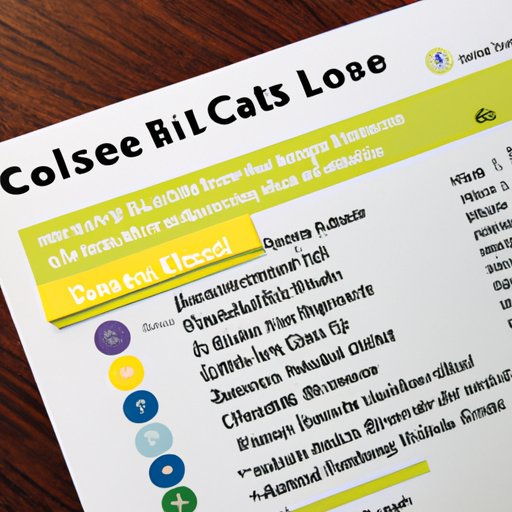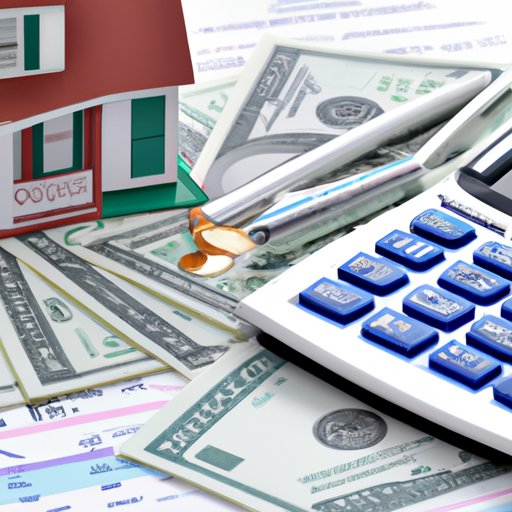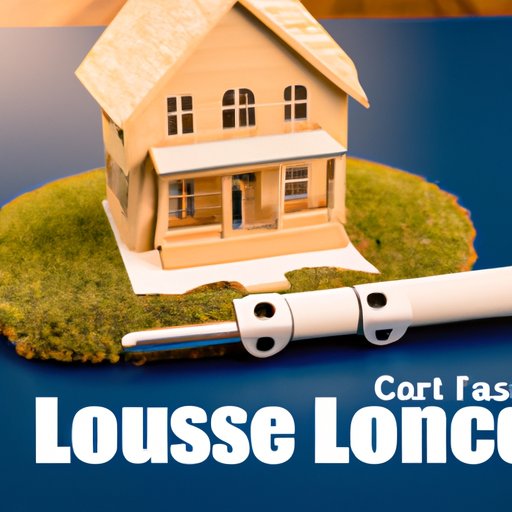Introduction
Buying a home is one of the biggest financial decisions that most people make during their lifetime. As such, it’s important to understand all the costs associated with the process. Closing costs are an essential part of the home-buying process and should be taken into account when budgeting for a new home. In this article, we will explore what closing costs are and how much you can expect to pay when buying a house.

A Comprehensive Guide to Closing Costs for Homebuyers
Closing costs refer to the various fees and expenses associated with the finalization of a real estate transaction. These costs vary from state to state, but typically include fees for services such as loan origination, title insurance, appraisal, and other miscellaneous expenses. Understanding the types of closing costs, who pays what, and how to prepare to pay them are important steps in the home-buying process.
Understanding the Types of Closing Costs
The types of closing costs that you may encounter when buying a home include loan origination fees, title insurance, appraisal fees, transfer taxes, recording fees, and more. Loan origination fees are charged by the lender for processing the loan application, while title insurance protects the buyer from any potential future claims against the property. Appraisal fees cover the cost of appraising the home and transfer taxes are imposed by the local government. Recording fees are paid to the county recorder for filing the deed and other documents related to the sale.
Who Pays What?
The seller typically pays for some of the closing costs, while the buyer is responsible for the rest. The exact breakdown of who pays what varies from state to state, but typically the buyer will pay for things like loan origination fees, title insurance, and other miscellaneous expenses. The seller usually pays for transfer taxes, recording fees, and other costs associated with the sale.
Preparing to Pay Closing Costs
When preparing to buy a home, it’s important to plan ahead and budget for closing costs. Make sure to ask your lender for an estimate of closing costs so that you know exactly how much you’ll need to pay. You should also keep in mind that some of these costs may be tax deductible, so consult with a tax professional to see if any of your closing costs qualify.
What are the Typical Closing Costs for a House?
Closing costs can vary significantly depending on where you live, the size of the home, and other factors. However, there are certain fees and expenses that are common to most real estate transactions. Here’s a look at some of the most common closing costs:
Common Fees and Expenses
• Loan origination fee: This fee covers the cost of processing the loan application and is typically paid by the buyer. The amount of this fee can vary from lender to lender, so it’s important to shop around for the best rate.
• Appraisal fee: An appraisal is required to determine the fair market value of the home. This fee is typically paid by the buyer and can range from $200 to $500.
• Title insurance: Title insurance protects the buyer from any potential future claims against the property. The cost of this insurance is usually split between the buyer and seller.
• Homeowner’s insurance: Homeowner’s insurance is required by most lenders and is typically paid by the buyer. The cost of this insurance can vary significantly depending on the location and size of the home.
How Much Can You Expect to Pay?
Closing costs can add up quickly, so it’s important to know what to expect. According to a survey by Bankrate, the average closing costs for buyers are around $3,700. Of course, this amount can vary significantly depending on the size of the home, the location, and other factors. It’s always a good idea to ask your lender for an estimate of closing costs before you make an offer on a home.
Analyzing Closing Costs and How to Reduce Them
It’s important to analyze your closing costs to make sure you’re not paying more than necessary. There are several ways to reduce your closing costs, including negotiating with the seller and avoiding unnecessary charges. Here’s a look at some of the strategies you can use to reduce your closing costs:
Negotiating Closing Costs
In some cases, the seller may be willing to negotiate on closing costs. This is especially true in competitive housing markets where sellers want to attract more buyers. If you’re able to get the seller to agree to pay some or all of your closing costs, this could save you a significant amount of money.
Avoiding Unnecessary Charges
Some lenders charge unnecessary fees and expenses that you don’t really need. Make sure to read through your loan documents carefully and ask questions about any fees or charges that don’t seem necessary. You may be able to get the lender to waive some of these fees, which can save you money.

Understanding the Fees and Expenses of Buying a Home
In addition to closing costs, there are several other fees and expenses associated with buying a home. Here’s a look at some of the most common ones:
Mortgage Loan Origination Fee
This fee covers the cost of processing the loan application and is typically paid by the buyer. The amount of this fee can vary from lender to lender, so it’s important to shop around for the best rate.
Appraisal Fee
An appraisal is required to determine the fair market value of the home. This fee is typically paid by the buyer and can range from $200 to $500.
Title Insurance
Title insurance protects the buyer from any potential future claims against the property. The cost of this insurance is usually split between the buyer and seller.
Homeowner’s Insurance
Homeowner’s insurance is required by most lenders and is typically paid by the buyer. The cost of this insurance can vary significantly depending on the location and size of the home.
How Much Can You Expect to Pay in Closing Costs?
Closing costs can vary significantly depending on where you live, the size of the home, and other factors. According to a survey by Bankrate, the average closing costs for buyers are around $3,700. Of course, this amount can vary significantly depending on the size of the home, the location, and other factors. It’s always a good idea to ask your lender for an estimate of closing costs before you make an offer on a home.
Conclusion
Closing costs are an essential part of the home-buying process and should be taken into account when budgeting for a new home. Understanding the types of closing costs, who pays what, and how to prepare to pay them are important steps in the home-buying process. Knowing what fees and expenses to expect and how to reduce them can help make the process smoother and less stressful.
(Note: Is this article not meeting your expectations? Do you have knowledge or insights to share? Unlock new opportunities and expand your reach by joining our authors team. Click Registration to join us and share your expertise with our readers.)
